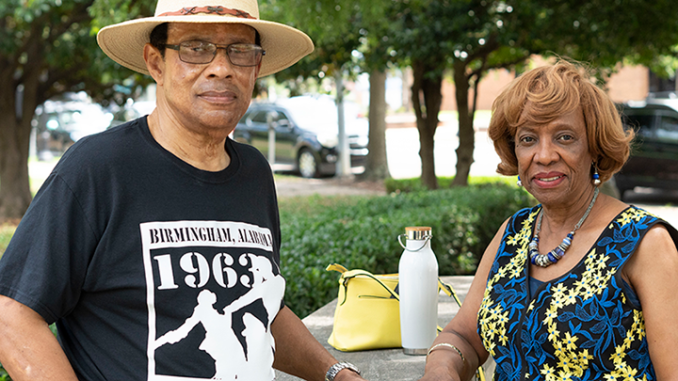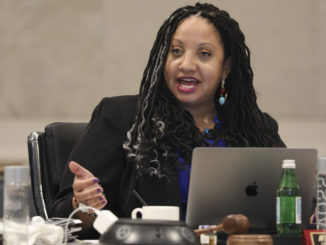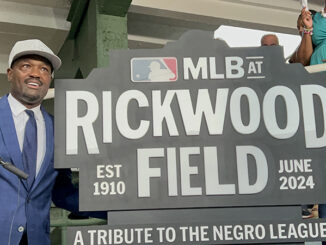
By Charlene Richards
NABJ Monitor
When a call to action for Black children to march against segregation and unfair treatment in educational spaces and public facilities began in Birmingham, students skipped school in numbers, catching rides, running and walking to meet up at 16th Street Baptist Church.
“We left school to participate in the Civil Rights movement,” Paulette Roby, a Children’s Crusader, told the NABJ Monitor.
This year, Birmingham commemorates the 60th anniversary of the Children’s Crusade, in which thousands of Black children skipped school and marched hand in hand from Kelly Ingram Park to protest for their freedom and civil rights.
The efforts of these children, which were accompanied by horrific images that captured children being attacked by police dogs and officers, being knocked off their feet by high-pressure water hoses and put in jail for their presence, brought sympathy and attention to the landmark Civil Rights Act, which was signed into federal law and enacted in 1964.
A number of these children who gathered the courage and passion 60 years ago are still alive today, many continuing their fight by educating younger generations and encouraging activism and civic engagement for racial justice and equality.
Gwendolyn Sanders Gamble, Paulette Roby and Janice Kelsey recently talked with NABJ Monitor about their actions and hopes for the future.
“This was a fight for humanity, not just a fight for Blacks,” Gamble, a retired Birmingham Public Schools educator, said. “When we were marching, it never hit me that we were making history because that wasn’t what it was all about for me at the time. I wanted a change, and I wanted to see a change because of the things I had experienced even at 15 years old.”
Growing up in the Jim Crow era was not easy for Black children as a result of segregation and racial disenfranchisement. Black children did not have freedom like their white counterparts.
They couldn’t attend schools with white children and received limited education resources in segregated schools with outdated textbooks and supplies. Black families couldn’t eat at restaurants or even sit in community parks.
The church filled up with determined students who sang freedom songs, helped with signs and learned from civil rights leaders James Luther Bevel, the Rev. Dr. Martin Luther King and the Rev. Frederick Shuttlesworth about non-violent strategies, Roby said.
“I was willing to put my life on the line along with others who were attacked by the police commissioner at the time, Eugene ‘Bull’ Connor,” Gamble said. “We were faced with dogs, with the water hoses and so many other traumatic things that you couldn’t imagine.”
As students protested, police officers flung their batons and released dogs, and many students were arrested and taken to jail or the Fair Park Arena, where they were isolated as a form of punishment.
“I remember getting at least a block away from 16th Baptist Church, and they loaded all of us in a school bus,” Roby said. “I was one of those they took over to Fair Park Arena, not only an amusement park but it was also used for livestock. They left us out there–it was raining. Those freedom songs really got me over, I can say.”
Janice Kelsey, a high school student who had been arrested during the protests, also recounted the memories of her efforts that led to the enactment of the Civil Rights Act of 1964.
“It means a lot to me because I reflect on the feelings I had 60 years ago to right some of the wrongs that had been put upon me.” Kelsey said. “I still feel that we have not overcome. We’ve made progress but not sufficient progress. I’m happy to be here and I’m happy to see the changes that have occurred, but I think we need to be mindful that the job is not done.”
The efforts of thousands of children crusaders in 1963 have prompted a ripple effect that transcends time today and recognizes that the work is not done.
In 2013, President Barack Obama honored a tragedy that happened four months after the Children’s Crusade — a racially motivated church bombing in Birmingham, Alabama, that claimed the lives of four Black girls who were attending Sunday school. He honored the girls with the Gold Congressional Medal.
Many participants of the Children’s Crusade in 1963 are still fired up to this day with endless passion and determination. Roby continues her fight as chairwoman of the Civil Rights Activist Committee, “Home of the Foot Soldiers,” in the Black Business District. Voter registration and collaborating with businesses, churches and schools are ways she ensures that the legacy continues in the magic city of Birmingham.
“I will continue to serve this organization and continue to teach and reach back and make sure that the younger generation understand how important it is for them to vote,” Roby said. “Voting is a must and we must continue to educate our community about the process of voting and that’s what this organization is about.”




Be the first to comment